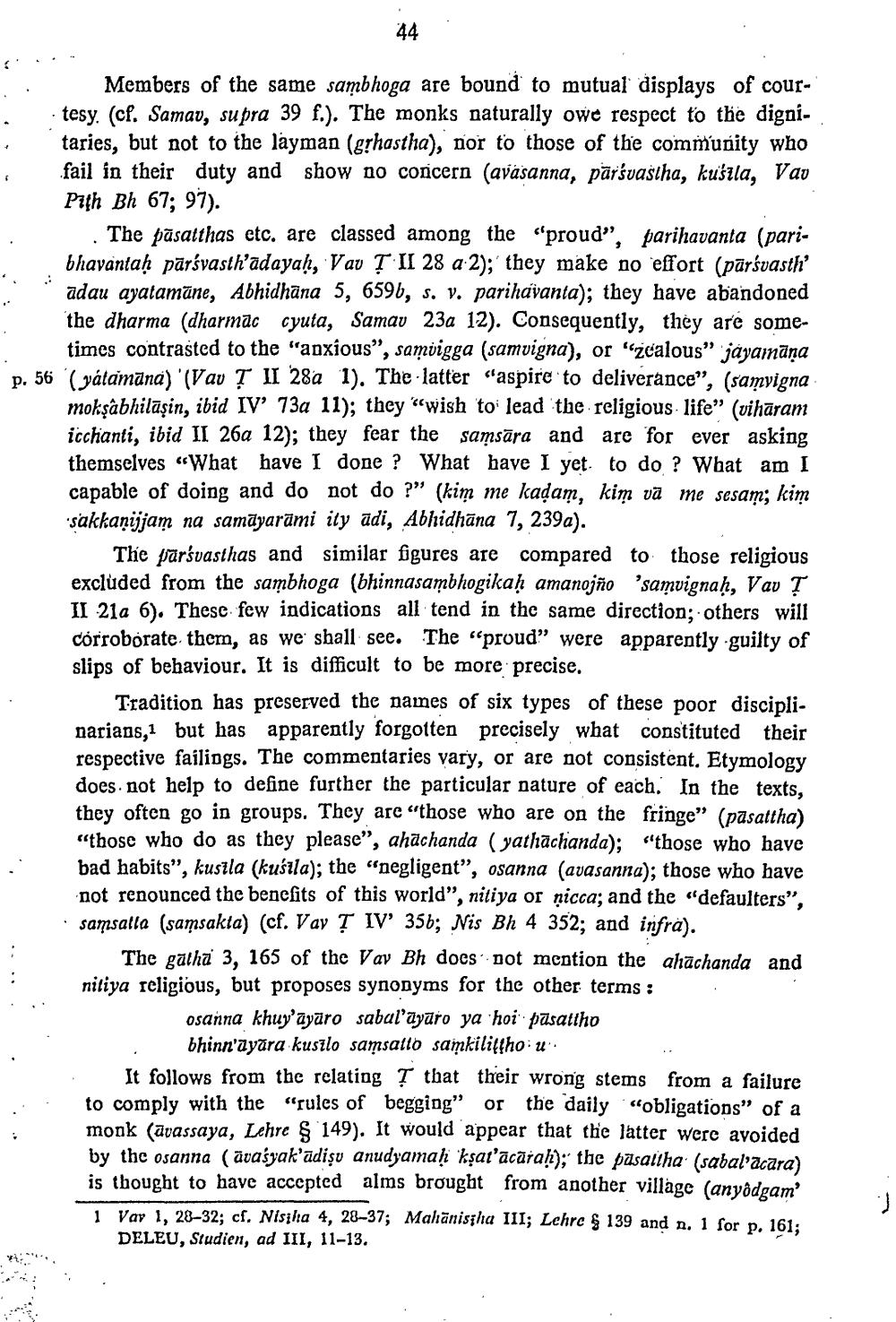________________
44
Members of the same sambhoga are bound to mutual displays of courtesy. (cf. Samav, supra 39 f.). The monks naturally owe respect to the dignitaries, but not to the layman (gļhastha), nor to those of the community who fail in their duty and show no concern (avasanna, pārsvastha, kušila, Vav Pith Bh 67; 97).
The pūsatthas etc. are classed among the “proud”, parihavanta (paribhavantaḥ pārsvasth'adayaḥ, Vav Ţ II 28 a 2); they make no effort (pārsvasth' adau ayatamāne, Abhidhāna 5, 6596, s. v. parihavanta); they have abandoned the dharma (dharmac cyuta, Samav 23a 12). Consequently, they are some
times contrasted to the "anxious”, samvigga (samvigna), or "žalous” jayaināņa p. 56 (válamāna) (Vav Ţ II 28a 1). The latter “aspire to deliverance”, (samvigna
mokşâbhilāşin, ibid IV' 73a 11); they "wish to lead the religious life” (vihāram icchanti, ibid II 26a 12); they fear the samsāra and are for ever asking themselves “What have I done ? What have I yet. to do? What am I capable of doing and do not do ?" (kim me kadam, kim va me sesam; kim sakkanijjam na samāyarāmi ily ūdi, Abhidhāna 7, 239a).
The parsvasthas and similar figures are compared to those religious excluded from the sambhoga (bhinnasambhogikah amanojño 'samvignah, Vav T II 21a 6). These few indications all tend in the same direction; others will corroborate them, as we shall see. The "proud” were apparently .guilty of slips of behaviour. It is difficult to be more precise,
Tradition has preserved the names of six types of these poor disciplinarians,1 but has apparently forgotten precisely what constituted their respective failings. The commentaries vary, or are not consistent. Etymology does not help to define further the particular nature of each. In the texts, they often go in groups. They are "those who are on the fringe" (pasattha) “those who do as they please”, ahāchanda (yathachanda); "those who have bad habits", kusila (kuśila); the "negligent", osanna (avasanna); those who have not renounced the benefits of this world", nitiya or nicca; and the "defaulters". samsalla (samsakta) (cf. Vay Ţ IV 356; Nis Bh 4 352; and infra).
The gatha' 3, 165 of the Vav Bh does not mention the ahachanda and nitiya religious, but proposes synonyms for the other terms:
osanna khuyavaro sabatayaro va hoi basalthp
bhinn'ayāra kusilo samsallo samkilifthou. It follows from the relating Ț that their wrong stems from a failure to comply with the "rules of begging" or the daily "obligations" of a monk (avassaya, Lehre § 149). It would appear that the latter were avoided by thc osanna (ävasyak'adişu anudyamah kşat'ācārah); the pasaliha (sabalacara) is thought to have accepted alms brought from another village (anyôdgam' 1 Vay 1, 28-32; cf. Nisiha 4, 28-37; Mahānisiha III; Lehrc & 139 and 1. 1 for p. 161;
DELEU, Studien, ad III, 11-13.




